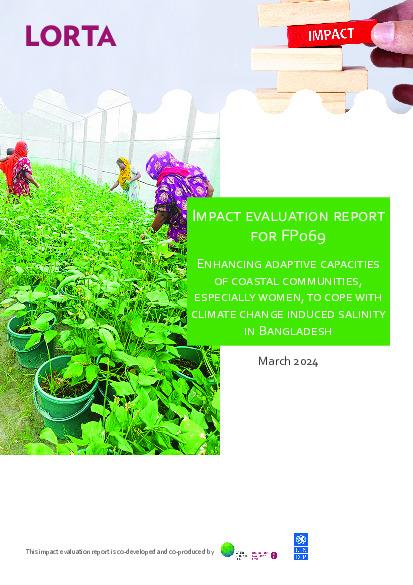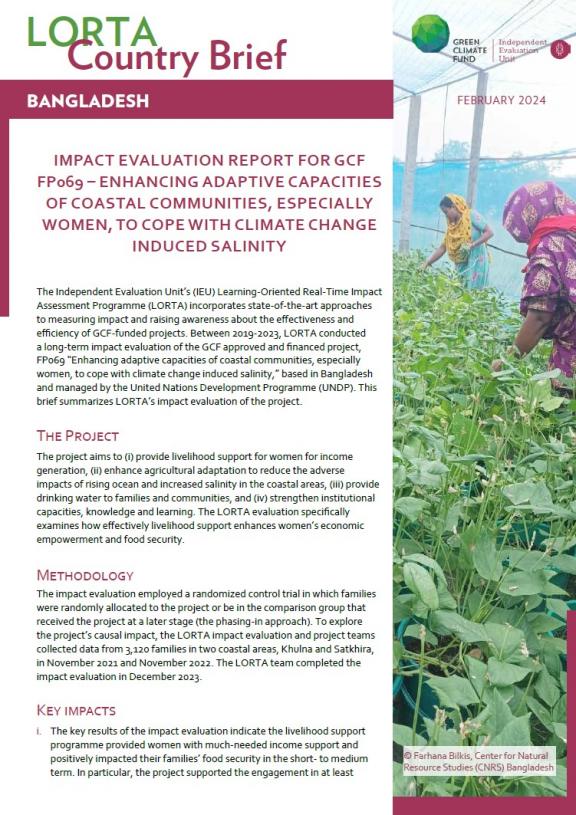FP069
Enhancing adaptive capacities of coastal communities, especially women, to cope with climate change induced salinity
Enhancing adaptive capacities of coastal communities, especially women, to cope with climate change induced salinity
Support for livelihoods and provision of clean water
This evaluation focuses on examining the causal impacts of adopting climate-resilient livelihoods and implementing solutions for clean drinking water on the well-being of beneficiaries in two districts in the coastal area of south-western Bangladesh. The south-western region has been facing significant challenges that arise due to its low elevation, saline water intrusion and the increasing occurrence of natural disasters.
Despite efforts to reduce the impacts of disasters and to increase climate resilience, the country's vulnerability remains high. Implemented by UNDP, this project provides adaptive livelihoods to women's livelihood groups for women's engagement and empowerment and constructs rainwater harvesting systems to ensure water supply.
The evaluation will measure the impact of to what extent adaptive livelihoods provide sustainable means of earnings and how much drinking water solutions allow beneficiaries to engage in income generating activities, especially for women.
-
TopicWater security & management
-
Project componentClimate-resilient livelihoods and drinking water solutions
-
Impact evaluation designRandomised Control Trial (RCT)
-
Target beneficiariesFemales make up 50% of the 245,516 direct beneficiaries|The impact evaluation sample consisted of 3,120 households
Timeline
Onboarded to LORTA
Apr 2019
Baseline data collected
Sep 2021
Endline data collected
Oct 2022
Baseline report published
Mar 2023
Midline report published
Mar 2024
Endline report to be published
Jun 2026
One region
- Asia-Pacific
One country
- Bangladesh
Reports
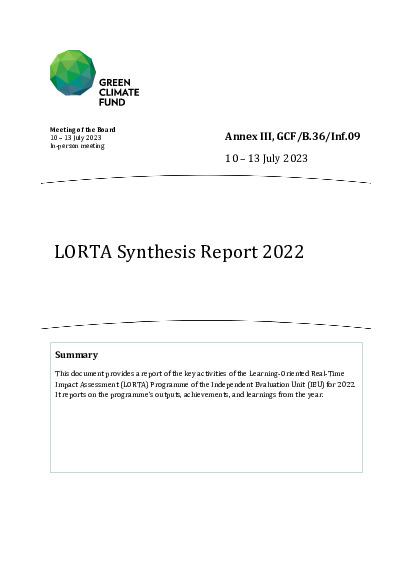
LORTA Synthesis Report 2022
19 Jun 2023
This document provides a report of the key activities of the LORTA Programme for 2022. It is Annex III of a report of the key activities of the Independent Evaluation Unit (IEU) for the period of 1 January to 30 April 2023. It reports on the IEU’s outputs and achievements in line with its Board-approved work plan for 2023.
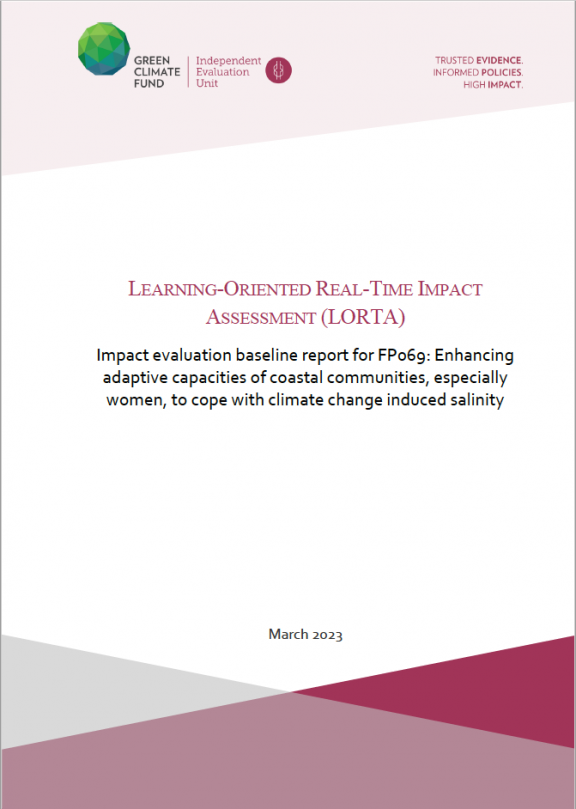
Impact evaluation baseline report for FP069: Enhancing adaptive capacities of coastal communities, especially women, to cope with climate change induced salinity
28 Mar 2023
This report presents the baseline data for “Enhancing adaptive capacities of coastal communities, especially
women, to cope with climate change induced salinity”, a project funded by the Green Climate Fund and implemented by the United Nations Development Programme in Bangladesh. This baseline report provides insights and summary statistics about the socioeconomic situation of project households before project implementation.
Impact
The key results of the impact evaluation indicate the livelihood support programme provided women with much-needed income support and positively impacted their families’ food security in the short- to medium term. In particular, the project supported the engagement in at least one income-generating activity, with homestead gardening being the most popular. It also increased women’s annual income by 14,000 Bangladeshi Taka (USD 165). Overall, the project improved their food security by 8 per cent, as measured by the consumption of food types important for well-being and health (from 55 to 60 out of 112 points measured by the Food Consumption Score). Family awareness of the importance of preparing for future climate-related shocks increased by four percentage points (from 91 to 95 per cent).
Despite the ability of women to diversify their income-generating activities, the project did not result in women gaining more autonomy over how to spend their generated income. This limitation can be attributed to the predominantly patriarchal culture in the southwestern provinces of Bangladesh, where males typically make decisions regarding family finances. Changing such deeply ingrained perceptions, lifestyles, and decision-making processes may require more time and sustained effort. Nevertheless, female empowerment remains a crucial objective of FP069. Conducting long-term evaluations of the project could provide valuable insights into gender dynamics and potential avenues for transformation.
For more details, read the full report here.
Impact stories
![]()
Is the GCF targeting the right beneficiaries?
30 Jun 2023 / As mandated by the Paris Agreement, the Green Climate Fund (GCF) supports developing countries realize pathways towards low-emissions and climate-resilient development. These pathways are described in Nationally Determined Contributions (NDCs), which each Party to the Agreement updates every five years. To support this process, the GCF allocates half of its adaptation programming to particularly vulnerable countries: the small island developing States (SIDS), the least developed countries (LDCs) and African States.
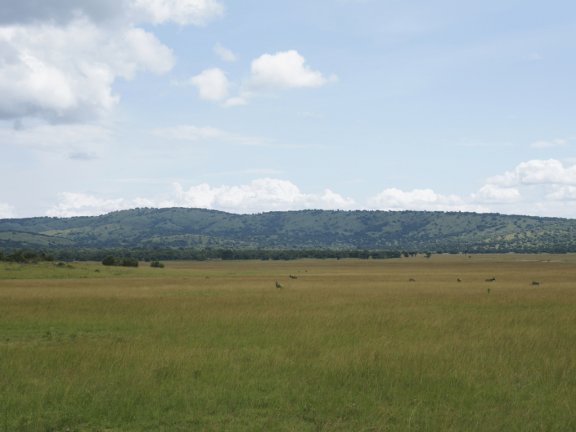
Is the GCF targeting the right beneficiaries?
30 Jun 2023 / As mandated by the Paris Agreement, the Green Climate Fund (GCF) supports developing countries realize pathways towards low-emissions and climate-resilient development. These pathways are described in Nationally Determined Contributions (NDCs), which each Party to the Agreement updates every five years. To support this process, the GCF allocates half of its adaptation programming to particularly vulnerable countries: the small island developing States (SIDS), the least developed countries (LDCs) and African States.
Details
As a response to past disasters and a preventive measure against future disasters, the United Nations Development Programme (UNDP) in Bangladesh implemented the GCF funded project FP069 “Enhancing adaptive capacities of coastal communities, especially women, to cope with climate change induced salinity”. The project’s overall goal is to strengthen the adaptive capacities of selected Bangladesh coastal communities against the impacts of climate change through the adoption of climate-resilient livelihoods and an increase in drinking water availability.
Implementing partners of the project include UNDP Bangladesh, the Ministry of Women and Children Affairs (Bangladesh) and the Department of Public Health Engineering (Bangladesh).
